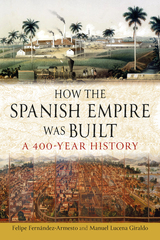173 books about Freedom and 4
start with G
173 books about Freedom and 4
173 books about Freedom
4 start with G start with G
4 start with G start with G
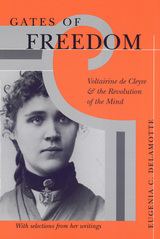
Gates of Freedom
Voltairine de Cleyre and the Revolution of the Mind
Eugenia C. DeLamotte
University of Michigan Press, 2004
"The question of souls is old; we demand our bodies, now." These words are not from a feminist manifesto of the late twentieth century, but from a fiery speech given a hundred years earlier by Voltairine de Cleyre, a leading anarchist and radical thinker. A contemporary of Emma Goldman---who called her "the most gifted and brilliant anarchist woman America ever produced"---de Cleyre was a significant force in a major social movement that sought to transform American society and culture at its root. But she belongs to a group of late-nineteenth-century freethinkers, anarchists, and sex-radicals whose writing continues to be excluded from the U.S. literary and historical canon.
Gates of Freedom considers de Cleyre's speeches, letters, and essays, including her most well known essay, "Sex Slavery." Part I brings current critical concerns to bear on de Cleyre's writings, exploring her contributions to the anarchist movement, her analyses of justice and violence, and her views on women, sexuality, and the body. Eugenia DeLamotte demonstrates both de Cleyre's literary significance and the importance of her work to feminist theory, women's studies, literary and cultural studies, U.S. history, and contemporary social and cultural analysis. Part II presents a thematically organized selection of de Cleyre's stirring writings, making Gates of Freedom appealing to scholars, students, and anyone interested in Voltairine de Cleyre's fascinating life and rousing work.
Gates of Freedom considers de Cleyre's speeches, letters, and essays, including her most well known essay, "Sex Slavery." Part I brings current critical concerns to bear on de Cleyre's writings, exploring her contributions to the anarchist movement, her analyses of justice and violence, and her views on women, sexuality, and the body. Eugenia DeLamotte demonstrates both de Cleyre's literary significance and the importance of her work to feminist theory, women's studies, literary and cultural studies, U.S. history, and contemporary social and cultural analysis. Part II presents a thematically organized selection of de Cleyre's stirring writings, making Gates of Freedom appealing to scholars, students, and anyone interested in Voltairine de Cleyre's fascinating life and rousing work.
Eugenia C. DeLamotte is Associate Professor of English, Arizona State University.
[more]
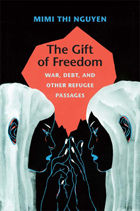
The Gift of Freedom
War, Debt, and Other Refugee Passages
Mimi Thi Nguyen
Duke University Press, 2012
In The Gift of Freedom, Mimi Thi Nguyen develops a new understanding of contemporary United States empire and its self-interested claims to provide for others the advantage of human freedom. Bringing together critiques of liberalism with postcolonial approaches to the modern cartography of progress, Nguyen proposes "the gift of freedom" as the name for those forces that avow to reverence aliveness and beauty, and to govern an enlightened humanity, while producing new subjects and actions—such as a grateful refugee, or enduring war—in an age of liberal empire. From the Cold War to the global war on terror, the United States simultaneously promises the gift of freedom through war and violence and administers the debt that follows. Focusing here on the figure of the Vietnamese refugee as the twice-over target of the gift of freedom—first through war, second through refuge—Nguyen suggests that the imposition of debt precludes the subjects of freedom from escaping those colonial histories that deemed them "unfree." To receive the gift of freedom then is to be indebted to empire, perhaps without end.
[more]
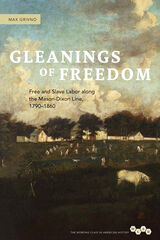
Gleanings of Freedom
Free and Slave Labor along the Mason-Dixon Line, 1790-1860
Max Grivno
University of Illinois Press, 2014
Late eighteenth- and early nineteenth-century landowners in the hinterlands of Baltimore, Maryland, cobbled together workforces from a diverse labor population of black and white apprentices, indentured servants, slaves, and hired workers. This book examines the intertwined lives of the poor whites, slaves, and free blacks who lived and worked in this wheat-producing region along the Mason–Dixon Line. Drawing from court records, the diaries, letters, and ledgers of farmers and small planters, and other archival sources, Max Grivno reconstructs how these poorest of southerners eked out their livings and struggled to maintain their families and their freedom in the often unforgiving rural economy.
[more]
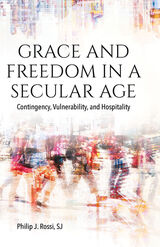
Grace and Freedom in a Secular Age
Contingency, Vulnerability, and Hospitality
Philip J. Rossi
Catholic University of America Press, 2022
In the course of a long and distinguished academic and civic career, the Canadian philosopher Charles Taylor has been, for articulate atheists and learned believers alike, an incisive, insightful, gracious, and challenging conversation partner on issues that arise at the intersection and interaction of religion, society, and culture.
Grace and Freedom in a Secular Age offers a concise exposition of key ideas – contingency, otherness, freedom, vulnerability and mutuality – that inform his probing analyses of the dynamics of religious belief and religious denial in the pervasive contemporary culture he calls a “a secular age,” within which religious belief and practice have, for many, become just an option. Those ideas provide the basis from which Rossi argues that, despite a clear-eyed recognition of the deep fractures of meaning and the pervasive fragmentation of once stable societal connections that a secular age has brought in its wake, Taylor also sees and affirms strong grounds for hope in a healing of our broken and fractured world and for the possibilities—and the importance of—active human participation in that healing. Taylor points to signs indicative of potent re-compositions and renewals taking place in religious belief and practice from its interaction with the dynamics of secular culture, particularly ones that make possible radical enactments of deeper human solidarity and mutuality, of which the one most often potent is the reconciliation of enemies. In pointing out these signs, Taylor suggests a richly expansive reading of the Christian doctrine of Creation, as it marks the radical contingency of all that is upon a freely bestowed divine self-giving: Creation is the ongoing enactment of the divine hospitality of the Triune God.
[more]
READERS
Browse our collection.
PUBLISHERS
See BiblioVault's publisher services.
STUDENT SERVICES
Files for college accessibility offices.
UChicago Accessibility Resources
home | accessibility | search | about | contact us
BiblioVault ® 2001 - 2024
The University of Chicago Press






